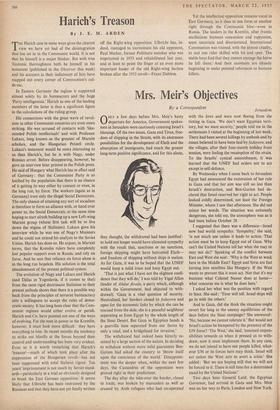Mrs. Meir's Objectives By a Correspondent O NLY a few days
before Mrs. Meir's hasty departure for America, Government spokes- men in Jerusalem were cautiously counting. Israel's blessings. Of the two issues, Gaza and Tiran, free- dom of shipping in the StraitS, with its enormous possibilities for the development of Elath and the absorption of immigrants, had much the greater long-term positive significance, and for this alone, they thought, the withdrawal had been justified : to hold out longer would have alienated sympathy with the result that, sanctions or no sanctions, foreign shipping might have boycotted Elath- and freedom of shipping without ships is useless. As for Gaza, it was to be hoped that the UNEF would keep a solid truce and keep Egypt out.
'That is just what I have not the slightest confi- dence that they will do,' I was told by Yigal Allon (leader of Ahdut Avoda, a party which, although within the Government, had objected to with- drawal). 'Gaza, is a vital question of security. Neutralised, her borders closed to fedayeen and open for the economic links by which she can be rescued from the dole, she is a peaceful neighbour separating us from Egypt by the whole length of the Sinai Desert. But Gaza in Egyptian hands is a guerrilla base separated from our farms by only a road, and a bridgehead for invasion.'
The withdrawal had indeed been bitterly re- sented by a large section of the nation. In deciding to withdraw without more solid guarantees Ben- Gurion had asked the country to 'throw itself upon the conscience of the world.' Disappoint- ment was the deeper when, within the next few days, the Cassandras of the opposition were proved right in their predictions.
The day after the take-over the border, closed to trade, was broken by marauders as well as crossed by Arab refugees who had co-operated Jerusalem with the Jews and were now fleeing from the rioting in Gaza. 'We don't want Egyptian terri- tory, but we want security,' people told me in the settlements I visited at the beginning of last week. There had been several killings by ambush and by .mines believed to have been laid by fedayeen, and the villages, after their four-month holiday from tension, were feeling the resumption of the strain. To the Israelis' cynical astonishment, it was learned that the UNEF had orders not to act except in self-defence.
By Wednesday when I came back to Jerusalem Egypt had announced the restoration of her rule in Gaza and that her aim was still no less than Israeli's destruction, and Ben-Gurion had de- clared that Israel reserved her right to act. People looked coldly determined, not least the Foreign Minister, whom I saw that afternoon. She did not mince her words. The situation was extremely dangerous, she told me, the atmosphere was as it had been before October 29.
I suggested that there was a difference—Israel now had world sympathy. 'Sympathy,' she said, 'is not much use unless it leads to action. That action must be to keep Egypt out of Gaza. Why can't the United Nations tell her what she may or may not do?' Speaking of the conflict between East and West she said : 'Why is the West so weak here in the Middle East? Egypt and Syria are fast turning into satellites like Hungary. If the West wants to prevent this it must act. Not that it's my business what Colonel Nasser does at home— what concerns me is what he does here.'
I asked her what was• the position with regard to Suez. She said : 'Time will tell. Israel ships will go in with the others.'
And in Gaza, did she think the situation might revert for long to the uneasy equilibrium of the days before the Sinai campaign? She answered: 'No, because we cannot tolerate it.' But would not Israel's action be hampered by the presence of the UN force? 'The West,' she mid, 'assumed respon- sibilities towards us when it pressed us to with- draw, now it must implement them. In any case, we do not intend to have our people killed, what- ever UN or its forces here may think. Israel• will act unless the West acts to avert a crisis.' She added : 'But we are hoping still that we will not be forced to it. There is still time for a determined stand by the United Nations.'
Two dayi later General Latif, the Egyptian Governor, had arrived in Gaza and Mrs. Meir was on her way to Paris, London and New York.


































 Previous page
Previous page